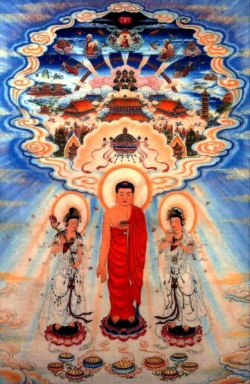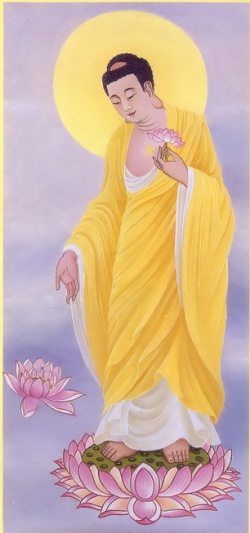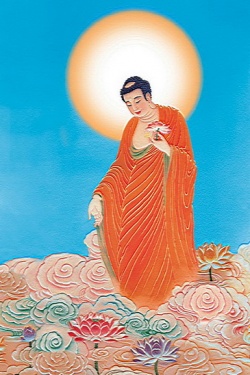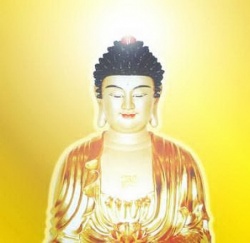Difference between revisions of "Law of Cause and Effect -- Foundation of Buddhism"
| Line 1: | Line 1: | ||
[[File:Url-uy.JPG|thumb|250px|]] | [[File:Url-uy.JPG|thumb|250px|]] | ||
<poem> | <poem> | ||
| − | Buddhism was taught in India by Sakyamuni Buddha 2,600 years ago. Buddha's teachings were compiled in more than 7,000 written works known as sutras. The foundation for all those sutras is the Law of Cause and Effect. | + | [[Buddhism]] was [[taught]] in [[India]] by [[Sakyamuni Buddha]] 2,600 years ago. [[Buddha's teachings]] were compiled in more than 7,000 written works known as [[sutras]]. The foundation for all those [[sutras]] is the [[Law of Cause and Effect]]. |
| − | Buddhism is like a tree. The Law of Cause and Effect is like the trunk and the roots. | + | [[Buddhism]] is like a [[tree]]. The [[Law of Cause and Effect]] is like the trunk and the [[roots]]. |
| − | If the roots or the trunk are cut, the tree dies. Likewise without knowing the Law of Cause and Effect, you can't really understand Buddhism. | + | If the [[roots]] or the trunk are cut, the [[tree]] [[dies]]. Likewise without [[knowing]] the [[Law of Cause and Effect]], you can't really understand [[Buddhism]]. |
So what exactly is a law? | So what exactly is a law? | ||
| − | The true essence of a law is something that applies everywhere, all the time. | + | The true [[essence]] of a law is something that applies everywhere, all the time. |
| − | Everywhere = Ten Directions (Up, down, and the eight directions on a compass) | + | Everywhere = [[Ten Directions]] (Up, down, and the [[eight directions]] on a {{Wiki|compass}}) |
[[File:Url-u.jpg|thumb|250px|]] | [[File:Url-u.jpg|thumb|250px|]] | ||
| − | All the Time = Three Worlds (Past, Present, Future) | + | All the Time = [[Three Worlds]] (Past, Present, Future) |
| − | A scientific law can be disproved with new data or proper evidence, and one country's law may not apply or may even be illegal in a foreign state. | + | A [[scientific]] law can be disproved with new {{Wiki|data}} or proper {{Wiki|evidence}}, and one country's law may not apply or may even be illegal in a foreign [[state]]. |
| − | The Law of Cause and Effect, according to Buddhism, represents Universal Truth. | + | The [[Law of Cause and Effect]], according to [[Buddhism]], represents [[Universal Truth]]. |
| − | Cause -------------------------------> Effect | + | [[Cause]] -------------------------------> Effect |
| − | This universal law states that every event, action, or moment in this lifetime has its own cause and effect. | + | This [[universal law]] states that every event, [[action]], or [[moment]] in this [[lifetime]] has its [[own]] [[cause and effect]]. |
| − | Examples of Cause and Effect | + | Examples of [[Cause and Effect]] |
| − | If there's a plane crash, there first has to be a cause for the plane to lose control. | + | If there's a plane crash, there first has to be a [[cause]] for the plane to lose control. |
Engine trouble ------------------------------------------------------------> Crash | Engine trouble ------------------------------------------------------------> Crash | ||
[[File:Url-te.jpg|thumb|250px|]] | [[File:Url-te.jpg|thumb|250px|]] | ||
| − | The same principle applies to positive effects. Let's say you are a student and a company in your career field increases its revenues. | + | The same [[principle]] applies to positive effects. Let's say you are a [[student]] and a company in your career field increases its revenues. |
Right Strategy --------------------------------------------------> Profit | Right Strategy --------------------------------------------------> Profit | ||
| Line 37: | Line 37: | ||
Study Hard ------------------------------------------------> New Job | Study Hard ------------------------------------------------> New Job | ||
| − | In this way, you can clearly see how every cause has its own effect. | + | In this way, you can clearly see how every [[cause]] has its [[own]] effect. |
| − | Buddha clarified the relationship between every cause and effect in this essential passage: | + | [[Buddha]] clarified the relationship between every [[cause and effect]] in this [[essential]] passage: |
[[File:Url-j.jpg|thumb|250px|]] | [[File:Url-j.jpg|thumb|250px|]] | ||
| − | Good deeds bring good results. | + | [[Good deeds]] bring good results. |
| − | Bad deeds bring bad results. | + | [[Bad deeds]] bring bad results. |
| − | Your own deeds bring your own results. | + | Your [[own]] [[deeds]] bring your [[own]] results. |
To understand this, let's think about a farm. | To understand this, let's think about a farm. | ||
| − | Sunflower seeds --------------------X-------------------> Watermelons | + | Sunflower [[seeds]] --------------------X-------------------> Watermelons |
NO!!! | NO!!! | ||
| − | If you were a farmer and you planted sunflower seeds, there is no way you could expect in your right mind to grow watermelons. It's simply impossible. | + | If you were a farmer and you planted sunflower [[seeds]], there is no way you could expect in your right [[mind]] to grow watermelons. It's simply impossible. |
| − | Obviously, the only way to grow watermelons is to plant watermelon seeds. And without planting any seeds, you can't get any fruits. | + | Obviously, the only way to grow watermelons is to plant watermelon [[seeds]]. And without planting any [[seeds]], you can't get any {{Wiki|fruits}}. |
| − | Watermelon seeds ------------------------------------> Watermelon | + | Watermelon [[seeds]] ------------------------------------> Watermelon |
YES!!! | YES!!! | ||
[[File:Url-ikl.jpg|thumb|250px|]] | [[File:Url-ikl.jpg|thumb|250px|]] | ||
| − | The seeds we plant with our thoughts, words, and actions are known as karma. | + | The [[seeds]] we plant with our [[thoughts]], words, and [[actions]] are known as [[karma]]. |
| − | Karma is what determines our destiny. | + | [[Karma]] is what determines our [[destiny]]. |
| − | You may have heard of karma before as... | + | You may have heard of [[karma]] before as... |
What goes around comes around. | What goes around comes around. | ||
| Line 70: | Line 70: | ||
| − | The Law of Cause and Effect differs from these passages, because in Buddhism your fate is never given or never chosen by a god. | + | The [[Law of Cause and Effect]] differs from these passages, because in [[Buddhism]] your [[fate]] is never given or never chosen by a [[god]]. |
| − | According to the Law of Cause and Effect, it's determined by you and your own actions. | + | According to the [[Law of Cause and Effect]], it's determined by you and your [[own]] [[actions]]. |
| − | We usually go along with this concept when we have good karma. "I must have done something great to deserve this!" | + | We usually go along with this {{Wiki|concept}} when we have [[good karma]]. "I must have done something great to deserve this!" |
| − | But when tides turn and we have bad karma, the last thing we do is go over all the bad things we've done. Instead it's, "Why me?" | + | But when tides turn and we have [[bad karma]], the last thing we do is go over all the bad things we've done. Instead it's, "Why me?" |
| − | This is all because everything in your life is tied to your past actions, words, or even thoughts. | + | This is all because everything in your [[life]] is tied to your {{Wiki|past}} [[actions]], words, or even [[thoughts]]. |
| − | The place you were born, the country you live in, being male or female, the people you love or meet on the street, are all determined by karma. | + | The place you were born, the country you live in, being {{Wiki|male}} or {{Wiki|female}}, the [[people]] you [[love]] or meet on the street, are all determined by [[karma]]. |
| − | Because the Law of Cause and Effect is the Universal Truth, there are many more factors like past karma and also varying conditions. | + | Because the [[Law of Cause and Effect]] is the [[Universal Truth]], there are many more factors like [[past karma]] and also varying [[conditions]]. |
But in short, it means... | But in short, it means... | ||
| − | Stop Evil; Do Good. | + | Stop [[Evil]]; Do Good. |
| − | We all want favorable effects and are afraid of negative outcomes. So once we understand the Law of Cause and Effect, it's only natural to refrain from committing evil, the cause of future sorrow, and to do more good, the cause of future happiness. | + | We all want favorable effects and are afraid of negative outcomes. So once we understand the [[Law of Cause and Effect]], it's only natural to refrain from committing [[evil]], the [[cause]] of {{Wiki|future}} [[sorrow]], and to do more good, the [[cause]] of {{Wiki|future}} [[happiness]]. |
| − | In the next post, I will review some more advanced concepts of the Law of Cause and Effect before moving forward to teachings that are specific to the school of Pure Land Buddhism. | + | In the next post, I will review some more advanced [[Wikipedia:concept|concepts]] of the [[Law of Cause and Effect]] before moving forward to teachings that are specific to the school of [[Pure Land Buddhism]]. |
</poem> | </poem> | ||
{{R}} | {{R}} | ||
[http://mirrorofdharma.blogspot.com.au/2013/03/law-of-cause-and-effect-foundation-of.html mirrorofdharma.blogspot.com.au] | [http://mirrorofdharma.blogspot.com.au/2013/03/law-of-cause-and-effect-foundation-of.html mirrorofdharma.blogspot.com.au] | ||
[[Category:Law of Cause and Effect]] | [[Category:Law of Cause and Effect]] | ||
Latest revision as of 05:57, 26 February 2016
Buddhism was taught in India by Sakyamuni Buddha 2,600 years ago. Buddha's teachings were compiled in more than 7,000 written works known as sutras. The foundation for all those sutras is the Law of Cause and Effect.
Buddhism is like a tree. The Law of Cause and Effect is like the trunk and the roots.
If the roots or the trunk are cut, the tree dies. Likewise without knowing the Law of Cause and Effect, you can't really understand Buddhism.
So what exactly is a law?
The true essence of a law is something that applies everywhere, all the time.
Everywhere = Ten Directions (Up, down, and the eight directions on a compass)
All the Time = Three Worlds (Past, Present, Future)
A scientific law can be disproved with new data or proper evidence, and one country's law may not apply or may even be illegal in a foreign state.
The Law of Cause and Effect, according to Buddhism, represents Universal Truth.
Cause -------------------------------> Effect
This universal law states that every event, action, or moment in this lifetime has its own cause and effect.
Examples of Cause and Effect
If there's a plane crash, there first has to be a cause for the plane to lose control.
Engine trouble ------------------------------------------------------------> Crash
The same principle applies to positive effects. Let's say you are a student and a company in your career field increases its revenues.
Right Strategy --------------------------------------------------> Profit
You struggle to get a 4.0 GPA and do all your homework. Because of this, you find work easily.
Study Hard ------------------------------------------------> New Job
In this way, you can clearly see how every cause has its own effect.
Buddha clarified the relationship between every cause and effect in this essential passage:
Good deeds bring good results.
Bad deeds bring bad results.
Your own deeds bring your own results.
To understand this, let's think about a farm.
Sunflower seeds --------------------X-------------------> Watermelons
NO!!!
If you were a farmer and you planted sunflower seeds, there is no way you could expect in your right mind to grow watermelons. It's simply impossible.
Obviously, the only way to grow watermelons is to plant watermelon seeds. And without planting any seeds, you can't get any fruits.
Watermelon seeds ------------------------------------> Watermelon
YES!!!
The seeds we plant with our thoughts, words, and actions are known as karma.
Karma is what determines our destiny.
You may have heard of karma before as...
What goes around comes around.
You reap what you sow.
You only get what you give.
Every why has a wherefore.
No mill, no meal.
The Law of Cause and Effect differs from these passages, because in Buddhism your fate is never given or never chosen by a god.
According to the Law of Cause and Effect, it's determined by you and your own actions.
We usually go along with this concept when we have good karma. "I must have done something great to deserve this!"
But when tides turn and we have bad karma, the last thing we do is go over all the bad things we've done. Instead it's, "Why me?"
This is all because everything in your life is tied to your past actions, words, or even thoughts.
The place you were born, the country you live in, being male or female, the people you love or meet on the street, are all determined by karma.
Because the Law of Cause and Effect is the Universal Truth, there are many more factors like past karma and also varying conditions.
But in short, it means...
Stop Evil; Do Good.
We all want favorable effects and are afraid of negative outcomes. So once we understand the Law of Cause and Effect, it's only natural to refrain from committing evil, the cause of future sorrow, and to do more good, the cause of future happiness.
In the next post, I will review some more advanced concepts of the Law of Cause and Effect before moving forward to teachings that are specific to the school of Pure Land Buddhism.




